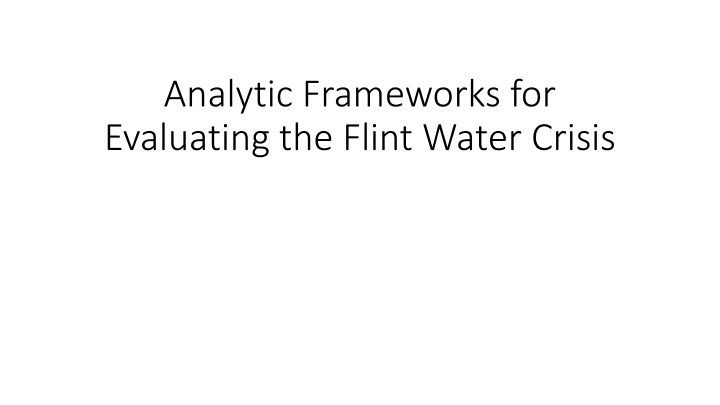
Analytic Frameworks for Evaluating the Flint Water Crisis
Explore various levels of analysis on how the Flint water crisis unfolded, including the state government's failures, prevailing cultures, decision-making consequences, and capacity to ignore risks. Dive into the complexities that led to this significant event with insights from experts in crisis management and organizational behavior.
Download Presentation

Please find below an Image/Link to download the presentation.
The content on the website is provided AS IS for your information and personal use only. It may not be sold, licensed, or shared on other websites without obtaining consent from the author. If you encounter any issues during the download, it is possible that the publisher has removed the file from their server.
You are allowed to download the files provided on this website for personal or commercial use, subject to the condition that they are used lawfully. All files are the property of their respective owners.
The content on the website is provided AS IS for your information and personal use only. It may not be sold, licensed, or shared on other websites without obtaining consent from the author.
E N D
Presentation Transcript
Analytic Frameworks for Evaluating the Flint Water Crisis
Epic Organizational Failure Crisis researchers will see this as one of the most important events in this time We have other awful examples (of crisis management) such as the space shuttle Challenger explosion and Hurricane Katrina, Flint will be that big of a deal. Matthew Seeger Wayne State University (Bridge Magazine also singled out the Epic orgaizational failures of the BP Deep Water Horizon Oil Spill and the response of the Catholic Church to the Child Molestation by Priests scandals)
How the State of Michigan Government Failed Flint This level of analysis focuses on the decisions which led to the leaching of lead from the pipe s in the water system of Flint and then the sources of delay in recognizing the magnitude so the result.
The Prevailing Cultures of State and Local Government This level of analysis focuses on the culture within the between the Department of Environmental Quality The Emergency Managers The Water Official of Flint The Department or Health and Human Services The Office of Governor The Mayors and City Councils
Consequences of Decision-Making on Water Treatment Made on the Basis of Cost and Feasibility Level of analysis suggested by Philippe Grandjean of Harvard University School of Public Health
Capacity of Human Beings to Ignore Risk Level of analysis suggested by Bob Seeger of Wayne State University which has several dimensions. Why did people in positions of authority ignore flashing red lights ? Why did experts with MDEQ, MDHHS stick to their own (often faculty) data analysis and ignoring (and at times) seeking to discredit findings from EPA expert Miguel Del Toral?
Why do organizations create tenacious justifications fro what s going on. By trying to be on the same page, people lose track (of what s important Bob Seeger Wayne University
The role of systemic racism, implicit bias, the legacy of segregation, and environmental injustice The 2017 report of the Michigan Civil Rights Commission assembled information which makes it possible to address such questions as: Would the Flint Water Crisis Happen in Beverly Hills? Did anyone intend to poison the people of Flint?
The role of law in transforming the case of Flint This level of analysis enables an examination of requirements imposed on Flint officials by the Safe Drinking Water Act of 1974 and obligations under the Lead and Copper rule. Also considered is analysis of obligations under the law for state officials reflected in the different felony and misdemeanor charges filed by the Michigan Attorney General against 15 state officials.
The Lawsuits under the Safe Drinking Water Act against the State of Michigan resulted in a settlement of $87 million requiring the government to replace lead contaminated pipes within 3 years With respect to criminal cases, 4 of 15 charged have pled guilty in return for reduced sentences. Others are contesting the charges. Police brutality has been considered a violation of civil rights. Environmental crimes have been contested under environmental laws. The Flint legal cases will be contested for years.
Do you believe the threat of punishment will make officials more accountable? A. Yes B.No
Do you believe that government officials, like police officers or firemen, should have strong protection against civil charges because otherwise they could not do their jobs? A. Yes B.No
Do you believe that government officials, like police officers or firemen, should have strong protection against criminal charges because otherwise they could not do their jobs? A. Yes B.No
